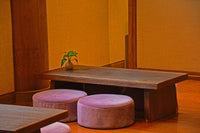AI usage becomes increasingly appealing for businesses, and the hospitality sector is no exception. Many luxury hotels implement innovative technologies and the Internet of Things to simplify and enhance guests’ experiences. Smart devices link to the Internet and, thus, can “communicate” with each other. Visitors control multiple devices from one location, mainly through cell phone applications. Therefore, they become less reliant on hotel staff. Easy, fast, and convenient room service boosts satisfaction and flexibility. Hotels, in their turn, become more luxurious, eco-friendly, and profitable.
The Development of Smart Hotel Features
A smart hotel concept emerged in the late 1990s - early 2000s with the introduction of electronic key cards and room entertainment facilities.
The Internet of Things (IoT) was the next stage in developing smart hotel strategies. In the 2010s, hotels started implementing multiple innovative devices into their operations. These included check-in card systems, automation of lighting and electricity, implementation of innovative HVAC systems, security cameras, sensor panels, and so on.
The transition to Software as a Service (SaaS) platforms enabled hotels to utilize data analytics and cloud computing to personalize their guests’ experiences and develop targeted market strategies.
Currently, hotels utilize numerous advanced technologies, including AI-driven customer services, voice recognition and control systems, and mobile applications. Technologies continue to evolve, bringing new challenges and opportunities. Modern and future hospitality trends focus on personalization, sustainability, and advanced guest engagement.
Smart Rooms Concept: Why They Gain Popularity
Due to increasing guests’ expectations regarding a sophisticated and luxurious rest, smart hotel rooms are becoming popular. Nowadays, visitors value and prioritize convenience and prefer to do something easier and faster. By ordering smart rooms in the hotels, clients enhance their experiences in many ways:
-
Better Control Over Their Stay: Mobile apps and voice control systems allow visitors to manage heating, lighting, air conditioning, mattresses, TVs, etc., enabling them to feel more comfortable and satisfied.
-
Affordability: Smart rooms are not novelties but top-notch features of contemporary hotels. More and more guests can afford to book such facilities without spending a fortune.
-
Safety: Smart room systems allow people to feel safer. When an error or problem occurs, such systems can alert guests and hotel staff about it.
-
Personalization Issues: Hotels value an individual approach towards serving their clients. Express your preferences and requirements, and be sure a smart room will be adapted to your needs.
-
Enhanced Entertainment: Smart rooms enable guests to keep the comfort of their home environment during trips. Visitors can integrate their private accounts into the smart room’s systems to watch their favorite movies, TV shows, and listen to music.
Smart Concierge Robots in Hotels
Digital solutions, automation, and self-service have become crucial components of our everyday lives. The modern hospitality sector has significantly evolved with the implementation of advanced room services technologies, but the introduction of the robot concierge has brought the hotel industry to new heights.
Imagine entering a lobby and being greeted by a friendly robot concierge, ready to assist with reservations, communicate with you, and answer basic questions about the hotel amenities and surroundings. The concept of having robot concierge services is not new, as the first similar “devices” appeared almost 10 years ago. Still, this technology is groundbreaking and constantly evolving.
What Robot Concierges Look Like
You can “meet” different robots performing concierge services in luxury hotels. Depending on the hotel's brand and budget, the robots’ design features may vary from minimalist to humanoid. They usually attract visitors with their sleek and futuristic looks.
-
Humanoid Robots: These robots usually boast a head-like screen that can mimic facial expressions. Some have arms for gesturing and eyes that boost human interaction.
-
Display & Interface Devices: These robots feature touchscreens depicting hotel maps and entertainment facilities. Their multilingualism makes them easy to interact with.
-
Sleek Bodies With Mobility: Some robots have wheels and can move around hotel lobbies, entertaining guests, especially children. They often have touchscreens or voice command features for interaction.
Main Advantages of Having a Concierge Robot
Having a robot as a concierge brings many perks to hotel owners. These advantages mainly relate to engagement with visitors, but they are not limited to this. Continue reading to learn more about this miracle of the modern hospitality industry.
Twenty-Four-Hour Availability
One of the most significant benefits of having a robotic concierge is its round-the-clock availability. This device does not require breaks like human staff; it is always ready to assist guests with check-ins, check-outs, and other vital issues.
Speed and Efficiency
With the help of a robot concierge, front desk operations take less time and fewer human efforts. Instead of standing in long queues and waiting until somebody serves you, the robot concierge can assist multiple guests simultaneously. The built-in AI features allow robots to gain experience from interaction with people and improve performance over time. The more tasks the robot handles and the more people it helps, the quicker it will work in the future.
Enhanced Security
Modern robots boast high-tech facial recognition technology, which helps hotel guests feel more comfortable and safer during their stay. It not only provides guests’ authorization but also helps hotel staff monitor guests’ movement within the building, enhancing security actions.
Multilingualism
Hotels usually welcome guests from various countries worldwide, which means that sometimes, communication challenges may occur, as people speak different languages. To avoid this, hotel owners use robots that can handle this issue. With a built-in multilingualism feature, the robot can help avoid language barriers at the front desk.
What the Future Holds
One can not underestimate the usefulness of robot concierges and smart hotel rooms. With rapid tech development, the emergence of robots and other intelligent hotel facilities is only a matter of time. Having the chance to interact with a robot once, people wish to have a similar experience again. Some even suggest that robots may replace humans in the future. Who knows, who knows.








